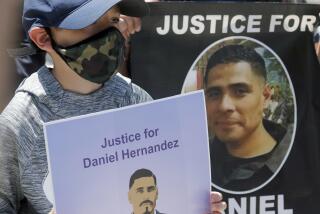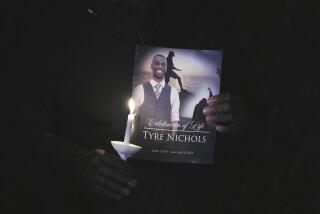Military rules prevent hung jury in Ft. Hood shooting trial
FT. HOOD, Texas -- The military jury that will decide the fate of Maj. Nidal Malik Hasan, accused of gunning down fellow soldiers in a bloody rampage at this military base, is an elite group -- all officers of his rank or higher.
Drawn from throughout the Army, the jury includes nine colonels, three lieutenant colonels and one major flown in from bases across the country. They will operate under rules that prevent hung juries and that encourage officers of differing ranks to speak freely and as equals once deliberations begin.
The jurors have worked as engineers and logistics specialists and in military intelligence, aviation, chemicals, ordnance, air defense artillery and the signal corps. All are decorated and have overseas experience, many in South Korea as well as in combat zones including Iraq and Afghanistan.
One is a military lawyer, or staff judge advocate; another is an Army flight instructor who served in combat in the Persian Gulf, the Balkans and Afghanistan and received a Bronze Star.
Hasan, 42, is defending himself with the aid of military legal advisors against 13 charges of premeditated murder and 32 charges of attempted murder in connection with the attack Nov. 5, 2009, at this sprawling Army base. The trial got underway with opening statements Tuesday.
Of the 13 jurors, all but two have command experience, a Ft. Hood spokesman said. (Military juries may have more than 12 members.)
Two jurors are women. One is the major, the lowest-ranking member of the jury and a graduate of West Point and Georgetown University’s business school. The other is a colonel, the sole African American juror and the highest-ranking by seniority. As such, she is serving as the jury “president,” or foreman.
Military legal experts say it’s not unusual to have a colonel lead a jury, or to have such a high-ranking jury when an officer is on trial. But a three-colonel jury does stand out, said Lisa Marie Windsor, a former Army lawyer who had been based at Ft. Hood and is now an attorney with the Tully Rinckey law firm in Washington.
“These people are going to have been solicited from all over the country to avoid them having any ties to Ft. Hood in an effort to ensure their impartiality,” Windsor said. “They want the cream of the crop.”
For the death penalty to remain an option at sentencing, the verdict must be unanimous. If fewer than two-thirds of the jurors vote guilty, they acquit; if two-thirds or more vote guilty but the verdict is not unanimous, they have a guilty verdict but Hasan cannot be sentenced to death, Windsor said.
The two-thirds threshold means that military courts don’t encounter an issue sometimes faced by civilian courts -- hung juries produced by one holdout.
But unlike civilian juries, military juries face the thorny issue of chain of command: How can a mixed-rank group of officers deliberate and vote independently?
“That’s the big difference between the military and civilian jury system -- these people are brought up through an environment where you do what your superior tells you to do. But you get into that jury room and you’re all equal, in theory anyway,” Windsor said.
The jury is supposed to have an open discussion and eventually vote by secret ballot to counter the influence of rank, Windsor said. The most junior member -- in this case, the major -- collects and counts the ballots, and then the jury president announces the verdict.
With more high-ranking officers on the jury hearing the Hasan case, “It certainly avoids any kind of influence of rank” among jurors, or lower-ranking jurors “feeling personally that they need to go with what the president thinks,” Windsor said.
ALSO:
Jurors in ‘Whitey’ Bulger trial begin deliberations
George W. Bush has stent surgery for blocked artery
Most of ‘Dream 9’ asylum applications moving forward
Follow L.A. Times National on Twitter
More to Read
Start your day right
Sign up for Essential California for news, features and recommendations from the L.A. Times and beyond in your inbox six days a week.
You may occasionally receive promotional content from the Los Angeles Times.







